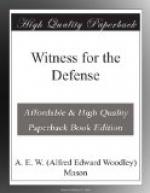“Will you smoke?”
Thresk, however, though he smoked had not during his stay in India acquired the taste for the cheroot; and it interested him in later times to reflect how largely he owed his entanglement in the tragic events which were to follow to that accidental distaste. For conscious of it he had brought his pipe with him, and he now fetched it out of his pocket.
“This, if I may,” he said.
“Of course.”
Thresk filled his pipe and lighted it, Ballantyne for his part lit a cheroot and replaced the box upon the top, close to a heavy riding-crop with a bone handle, which Thresk happened now to notice for the first time.
“Be quick!” he cried impatiently to Baram Singh, and seated himself in the swing-chair in front of the bureau, turning it so as not to have his back to Thresk at the table. Baram Singh hurriedly finished his work and left the marquee by the passage leading to the kitchen. Ballantyne waited with his eyes upon that passage until the grass-mat screen had ceased to move. Then taking a bunch of keys from his pocket he stooped under the open writing-flap of the bureau and unlocked the lowest of the three drawers. From this drawer he lifted a scarlet despatch-box, and was just going to bring it to the table when Baram Singh silently appeared once more. At once Ballantyne dropped the box on the floor, covering it as well as he could with his legs.
“What the devil do you want?” he cried, speaking of course in Hindustani, and with a violence which seemed to be half made up of anger and half of fear. Baram Singh replied that he had brought an ash-tray for the Sahib, and he placed it on the round table by Thresk’s side.
“Well, get out and don’t come back until you are called,” cried Ballantyne roughly, and in evident relief as Baram Singh once more retired he took a long draught from a fresh tumbler of whisky-and-soda which stood on the flap of the bureau beside him. He then stooped once more to lift the red despatch-box from the floor, but to Thresk’s amazement in the very act of stooping he stopped. He remained with his hands open to seize the box and his body bent over his knees, quite motionless. His mouth was open, his eyes staring, and upon his face such a look of sheer terror was stamped as Thresk could never find words to describe. For the first moment he imagined that the man had had a stroke. His habits, his heavy build all pointed that way. The act of stooping would quite naturally be the breaking pressure upon that overcharged brain. But before Thresk had risen to make sure Ballantyne moved an arm. He moved it upwards without changing his attitude in any other way, or even the direction of his eyes, and he groped along the flap of the bureau very cautiously and secretly and up again to the top ledge. All the while his eyes were staring intently, but with the intentness of extreme fear, not at the despatch-box but at the space of carpet—a couple of




